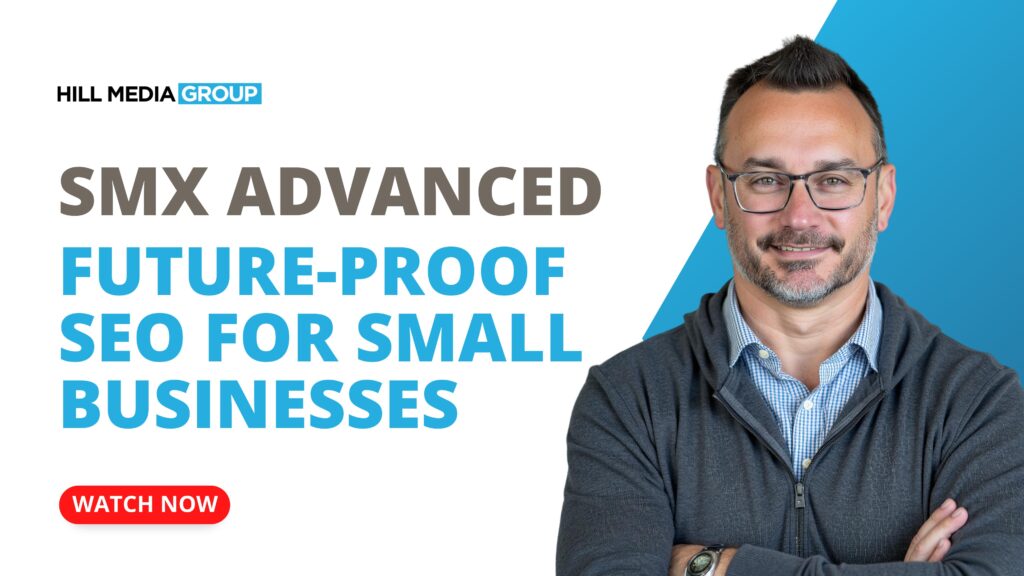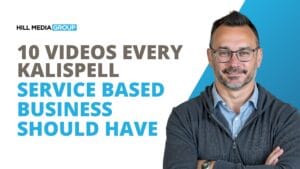SMX Advanced 2025 marked the first in-person SMX conference since early 2020, and it was worth the wait. Held in Boston, the event brought together some of the sharpest minds in search marketing to discuss how AI, structured data, and user-centric strategies are shaping the next generation of SEO.
For small businesses navigating the evolving digital landscape, this article breaks down the most valuable insights from each session I attended. Whether you’re trying to improve local visibility, prepare for AI-powered search engines, or future-proof your content strategy, these takeaways are designed to be both educational and actionable.
AI Search Optimization & Real User Engagement — Bart Goralewicz
Takeaways:
- Google is rewarding real user engagement signals (clicks, scrolls, dwell time).
- Sites with strong UX metrics see a higher correlation with top rankings.
- AI Overviews can generate traffic losses, but also expose gaps where your site can stand out.
What Small Businesses Should Do:
Focus on user experience — clear layouts, fast loading, mobile optimization, and content that satisfies intent. Optimize for people, not bots.
Generative Information Retrieval & the Future of SEO — Dawn Anderson
Takeaways:
- The foundation of SEO is shifting from keywords to entity relationships and context.
- Large Language Models (LLMs) are changing how search engines retrieve and rank content.
- Structured data and contextual integrity will play a bigger role.
What Small Businesses Should Do:
Make use of structured data (like schema markup) and clearly define what your business does. Even a basic FAQ section with rich snippets can go a long way.
SEO Embeddings & Google Ranking Factors — Eric Enge
Takeaways:
- Google is moving toward semantic understanding of content via vector embeddings.
- Relevance is being determined by how closely your content matches the meaning of a query, not just exact keywords.
What Small Businesses Should Do:
Cluster your content topically and ensure pages support a clear, shared theme. Consistency in language and intent matters more than keyword density.
Advanced SEO Indexing Strategies in the AI Era — Jes Scholz
Takeaways:
- Crawling and indexing are no longer guaranteed — Google is choosing which content is worth storing.
- Thin, duplicative, or low-engagement pages are increasingly ignored.
- Entity-first strategies and authoritative structured content help.
What Small Businesses Should Do:
Audit your site. Keep your most important pages indexable, consolidate thin content, and make your site architecture easy to navigate for both users and bots.
Google Algorithm Data Interpretation & Brand Impact — Morty Oberstein
Takeaways:
- Core updates are no longer focused on “ranking signals” alone — Google is judging site experience as a whole.
- Engagement and expertise indicators carry more weight.
What Small Businesses Should Do:
Treat your website like a storefront. Showcase expertise, make it easy to use, and prioritize clarity in content and calls to action.
SEO Paradigm Shift & AI Overviews Impact — Michael King
Takeaways:
- AI Overviews in Google may steal clicks, but they also amplify authoritative sources.
- Building trustworthy, structured, and cited content is key.
What Small Businesses Should Do:
Build content that answers specific questions. Use citations, include your credentials, and structure your posts so LLMs and humans alike can digest them.
Authenticity & Data-Driven SEO — Wil Reynolds
Takeaways:
- SEO success comes from genuinely helping users, not chasing algorithms.
- Data should guide human decisions, not replace them.
What Small Businesses Should Do:
Avoid shortcuts. Build content and services that actually serve your audience. If you’re running ads, make sure the landing page truly answers what the ad promised.
LLM Optimization for AI Search & MoE Models — Crystal Carter
Takeaways:
- Search engines are evolving into answer engines.
- LLMs and AI prefer structured, high-authority content.
What Small Businesses Should Do:
Review your site structure. Label sections clearly, use headings, and add supporting visuals where possible. Think of your pages like answers to questions.
Link Relevance & SEO Metrics in Modern Link Building — James Brockbank
Takeaways:
- Traditional link metrics (DA, DR) are outdated.
- Google is focused on relevance and topical authority.
- Too many irrelevant links can actually hurt rankings.
What Small Businesses Should Do:
Forget buying links. Instead, build local relevance by collaborating with local organizations, getting featured in industry blogs, and making your content worth referencing.
AI, SEO, and Content Strategy in the LLM Era — Kelsey Libert
Takeaways:
- LLMs prioritize authority, niche expertise, and structure.
- AI-generated content isn’t penalized — poor content is.
- Consumers are open to brands using AI if it’s done transparently.
What Small Businesses Should Do:
If you’re using AI tools to help write or brainstorm, great; make sure a human edits and adds insight. Invest in creating educational, expert-led content.
Agentic AI and the Future of SEO and Marketing — Dave Davies
Takeaways:
- Agents, not users, will increasingly control search and purchase decisions.
- Zero-click transactions and agent optimization are on the rise.
What Small Businesses Should Do:
Make sure your product and service data is complete, structured, and easy to read by machines. Listings, reviews, and feeds should be up-to-date across the web.
Generative Engine Optimization & Structured Content — Will Scott
Takeaways:
- Generative engines prefer clear, structured, step-by-step content.
- “Snippetifying” content helps it get picked up by AI and search features.
What Small Businesses Should Do:
Use headers, FAQs, and bulleted lists. Structure your posts like answers. Think about your content being read aloud by an assistant or AI agent.
Closing Keynote: SEO Evolution, AI, and Brand Strategy Trends for 2026 — Navah Hopkins, Martha Van Berkel, Sam Tomlinson, Mike Grehan
Takeaways:
- SEO is becoming data-driven, emotionally resonant, and user-focused.
- AI commoditizes execution — brand experience is the differentiator.
- Think like a data architect, not just an SEO.
What Small Businesses Should Do:
Don’t obsess over rankings. Focus on becoming the best answer. Create content that solves real problems and shows who you are.
Final Thoughts
The future of SEO is not about chasing the next algorithm hack; it’s about showing up with relevance, authority, and empathy. As AI reshapes how users search and how platforms deliver answers, small businesses have a unique opportunity: to be more human, more helpful, and more intentional.
If you’re ready to adapt your SEO strategy to the next era of search, book a 15-minute strategy session and let’s chart the best path forward together.




